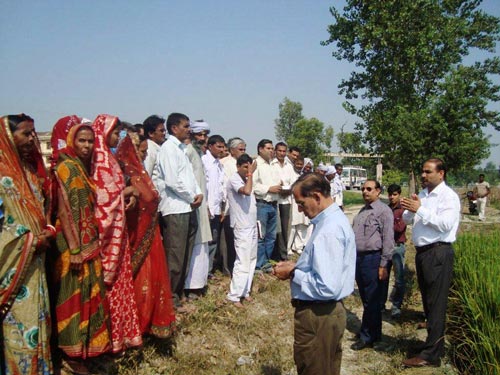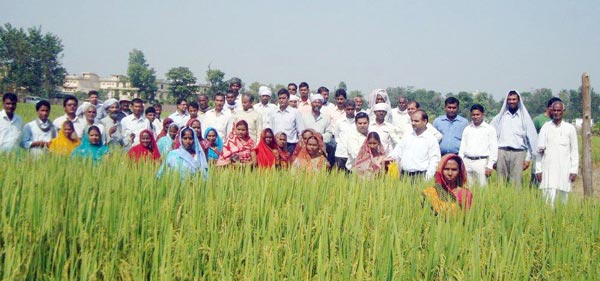 Under the aegis of Climate Change, Agriculture and Food Security (CCAFS), CIMMYT, Rajendra Agricultural University (RAU), and Indian Agricultural Research Institute (IARI) organized a travelling seminar on Climate Smart Practices. The seminar was attended by nearly 100 participants, including 60 farmers from village clusters in the CCAFS grid in Vaishali district of Bihar, scientists and officers from RAU, IARI, IFFCO Foundation, CIMMYT, Borlaug Institute for South Asia (BISA), Cereal System Initiative South Asia (CSISA), and several private organizations. The aim was to discuss opportunities for climate-smart practices.
Under the aegis of Climate Change, Agriculture and Food Security (CCAFS), CIMMYT, Rajendra Agricultural University (RAU), and Indian Agricultural Research Institute (IARI) organized a travelling seminar on Climate Smart Practices. The seminar was attended by nearly 100 participants, including 60 farmers from village clusters in the CCAFS grid in Vaishali district of Bihar, scientists and officers from RAU, IARI, IFFCO Foundation, CIMMYT, Borlaug Institute for South Asia (BISA), Cereal System Initiative South Asia (CSISA), and several private organizations. The aim was to discuss opportunities for climate-smart practices.
ML Jat (CIMMYT senior cropping systems agronomist) started the seminar with a summary of CCAFS activities, target regions, and priorities for Bihar. He stressed the importance of conservation agriculture (CA) for adaptation, mitigation, and risk management in farming practices in the context of emerging climatic extremes and projected effects of global climate change. In locations like Bihar, with typically uncertain weather, cropping system optimization is crucial for climate change adaptation; this optimization can be facilitated through CA-based management practices.
Jat also discussed the involvement of women farmers in decision making, which is critical not only for risk management but also for women’s empowerment, as it allows them to harness their full potential. Women are generally not involved in the decision making process and they often lack access to information, which prevents them from efficient decision making and full involvement in the farm system. Jat then explained some new nutrient management tools and techniques, such as the Nutrient Expert decision support systems for maize and wheat and the hand-held GreenSeeker sensors. Following the presentation, some farmers expressed their interest to learn about the Nutrient Expert tool in order to provide services to other farmers in their villages.
Raj Kumar Jat (CIMMYT cropping system agronomist) and Mukesh Kumar (RAU professor) discussed the key benefits of CA in terms of productivity enhancement, soil health improvement, water efficiency, production cost, and mitigation of greenhouse gas (GHG) emissions. IS Solanki (head of IARI-Pusa) and S Chowdhury (BISA seed specialist) then demonstrated seed production of single-cross maize hybrids with CA-based management practices (permanent beds). Solanki and his team also showed hybrid seed production of rice with complete seed chain (production to processing) and discussed opportunities for horticultural diversification. Solanki emphasized the importance of hybrid seed production directly by farmers to ensure timely availability of quality seed and to generate employment opportunities for farmers. RK Malik (CSISA coordinator for eastern India) shared CSISA experiences on alternate tillage, including direct dry seeded rice, mechanical transplanted rice, zero tillage, and raised bed planting. The farmers then visited a seed processing plant at an IARI station and observed the long-term CA experiment on rice-wheat and rice-maize systems established jointly by CIMMYT and RAU in 2006.
VP Singh (RAU director of research) highlighted the importance of this experiment: “CA-based crop management technologies are the way forward not only for reducing production cost and improving income but also for enhancing climate resilience and long-term sustainability of farming in Bihar.”
The Government of Bihar reflects Singh’s sentiment, as it has given high priority to CA and promised to provide over 5,000 zero-till planters to the farmers in 2012. Singh urged the farmers to adopt other best management practices as well, including timely planting, improved varieties, nutrient, water, and weed management practices for higher productivity and profitability, and efficient use of input to help mitigate GHG emissions.
In the end of the seminar, an interaction session was organized at a BISA farm where participants discussed key lessons and critical issues. The session included a demonstration of mechanized harvesting of maize using small multi-crop combine harvester.

 Climate adaptation and mitigation
Climate adaptation and mitigation 
